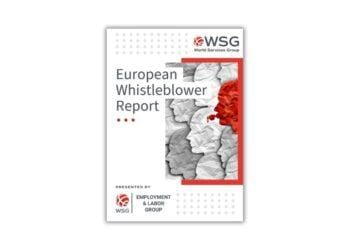Ensuring an inclusive, welcoming and ethical work environment should be a priority for all employers – especially those with corporate compliance obligations. Employers that encourage a workplace where employees feel safe when disclosing concerns, whether regarding a safety issue, an accounting irregularity or a failure to disclose certain losses, may be reducing liability risks that accompany incidences of external whistleblowing.
However, employers need to be cognizant of implementing strong retaliation protections for employees who report potential noncompliance with laws. This becomes especially relevant as the legal landscape may evolve to extend anti-retaliation protections to internal whistleblowers.
Whistleblowing Bounties
The surge of bounty awards in recent years has caused much concern for compliance departments. While ethics continued to be a top concern for corporations, many feared that the appeal of spectacular bounty awards would cause employees who normally would have reported incidents internally to go directly to enforcement agencies instead.
As an initial response, many corporations required that employees bring their complaints internally before taking them to an enforcement agency for resolution. This may aid in a swift assessment of the potential problem and provide the corporation with an opportunity to resolve the issue prior to outside agency involvement.
However, insisting that an employee keep a complaint confidential and impeding a federal investigation does not encourage internal whistleblowing – it merely invites further enforcement agency scrutiny.
Not surprisingly, enforcement agencies have concerns regarding employers proscribing contacts regarding legally protected communications. The SEC’s Rule 21F prohibits the impeding of any individual from communicating directly with the SEC regarding possible securities law violations. In addition, a director, officer, member, agent or employee of a represented entity may communicate directly with the SEC without having to seek prior consent from the entity’s counsel.
But this is a broader issue than that of whistleblowing: the National Labor Relations Board and the Equal Employment Opportunity Commission have regulated the restriction of employee communications, especially if there is a danger that a confidentiality agreement would muzzle a legitimate complaint that affects the public at large.
Encouraging Internal Disclosures
The most significant step an employer may take in encouraging employees to voice their concerns internally is to have a strong anti-retaliation and whistleblowing policy (registration required). The policy should list the specific steps, processes and protections that an employee may take in reporting potential misconduct or unethical practices. The policy must in no way impede an employee’s ability to seek redress through the SEC or other applicable agency.
It remains a hotly debated issue whether an employee who reports conduct internally without reporting the information to an outside agency is legally protected against retaliation. The SEC has taken the position for some time that the anti-retaliation protections apply whether or not the information was reported externally (even though mere internal reports may disqualify an employee from a bounty award).
Court Challenges
Employees who have disclosed information internally and who were then terminated have initiated lawsuits seeking protection under the Dodd-Frank Act’s anti-retaliation provisions. However, challenges have centered on the Dodd-Frank Act’s definition of whistleblower, which means “any individual who provides … information relating to a violation of the securities laws to the [SEC]” (15 U.S. Code § 78u–6, which addresses whistleblower incentives).
The interpretation of this definition has resulted in inconsistent outcomes. Some courts have accepted the plain reading of the provision, which states that only those who have communicated directly with the SEC may enjoy retaliation protections. In fact, the 5th Circuit’s 2013 opinion in Asadi v. G.E. Energy U.S., LLC adopted this interpretation, dismissing the lower courts’ and the SEC’s expansive reading of the statute as protecting an internal whistleblower.
But the SEC continues to favor an expansive definition.
SEC Interpretive Guidance
In August, the SEC issued guidance that addresses whether internal whistleblowing is protected by the Dodd-Frank Act. The agency formalized its previous position that internal whistleblowers enjoy the Dodd-Frank Act’s anti-retaliation protections. However, the SEC acknowledged that there may indeed be a difference between an internal whistleblower (one who reports misconduct to a compliance department, supervisor or corporate officer) and an external whistleblower (one who reports information directly to the SEC).
The difference, according to the SEC, is not in whether the whistleblower would receive anti-retaliation protections at all. Instead, the difference concerns the whistleblower’s eligibility for a bounty award. The SEC clarified in its guidance that although an internal whistleblower may not be retaliated against, only those whistleblowers who report information directly to the SEC would be able to reap any monetary rewards as a result of a case’s successful prosecution.
The SEC’s position allows for whistleblowers to enjoy the enhanced protections available under the Dodd-Frank Act, including the ability to claim double back pay for retaliation and a lengthy period in which to bring claims (as compared to other whistleblower protection statutes such as the Sarbanes-Oxley Act and the Occupational Safety and Health Act). The Dodd-Frank Act also allows whistleblowers to file cases in court directly without the need for prior administrative proceedings.
Although the SEC’s guidance may not prove dispositive in a court proceeding, the SEC’s expansive approach may be adopted by other federal courts (in opposition to the Asadi case), potentially setting up a Supreme Court resolution.
Conclusion
Whistleblowing is an evolving area of the law that requires close monitoring by compliance professionals, inside counsel and HR. Given the strong support for whistleblowers as a matter of public policy, there remains a strong possibility that the court decisions will eventually settle on an expansive interpretation of the definition of whistleblower, whether under the Dodd-Frank Act, the Sarbanes-Oxley Act or other federal laws containing anti-retaliation provisions.
For example, in its 2014 Lawson v. FMR, LLC decision, the Supreme Court resolved the question of whether a whistleblower would be protected under the Sarbanes-Oxley Act by electing an expansive definition of whistleblower that includes not only employees of public companies but also employees of contractors of public companies.
And deference to the SEC’s position is already evident in the courts. In one of the first cases to discuss the issue of internal whistleblowing following the release of the SEC’s interpretive guidance, a New Jersey federal district court – in an unpublished opinion (Dressler v. Lime Energy, No. 3:14-cv-07060, 2015 U.S. Dist. LEXIS 106532 (D.N.J. Aug. 13, 2015)) – declared the issue a “close call,” but ultimately deferred to the SEC’s position.



 Marta Moakley is the Legal Editor for the training and development, employee retention, performance appraisals, promotions, employee communications, managing employees in special situations, employee discipline, and recordkeeping and minimizing liability content in the employee management section of
Marta Moakley is the Legal Editor for the training and development, employee retention, performance appraisals, promotions, employee communications, managing employees in special situations, employee discipline, and recordkeeping and minimizing liability content in the employee management section of 





